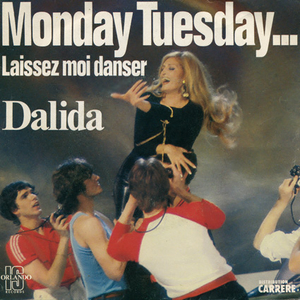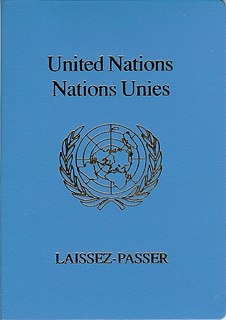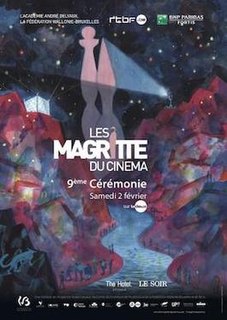Laissez-faire is an economic system in which transactions between private parties are free from any form of government intervention such as regulation, privileges, imperialism, tariffs and subsidies. Proponents of laissez faire argue for a complete separation of government from the economic sector. The phrase laissez-faire is part of a larger French phrase and literally translates to 'let [it/them] do'; however, in this context, the phrase usually means 'let go'.

"Monday Tuesday... Laissez moi danser" is a 1979-released disco single by French recording artist Dalida.
Let It Be most commonly refers to:
"Laissez briller le soleil" was the Belgian entry in the Eurovision Song Contest 1988, performed in French by Reynaert.
A travel document is an identity document issued by a government or international treaty organization to facilitate the movement of individuals or small groups of people across international boundaries, following international agreements. Travel documents usually assure other governments that the bearer may return to the issuing country, and are often issued in booklet form to allow other governments to place visas as well as entry and exit stamps into them. The most common travel document is a passport, which usually gives the bearer more privileges like visa-free access to certain countries. However, the term is sometimes used only for those documents which do not bear proof of nationality, such as a refugee travel document.

Laissez-nous respirer is the second studio album by French singer, Ilona Mitrecey. The album was released in 2006. It contains 14 songs, 2 of which are alternate versions of tracks from her first album.

Dutch passports are issued to citizens of the Kingdom of the Netherlands for the purpose of international travel. As the Netherlands only distinguish one category of citizen, for all countries in the Kingdom, passports are the same for all four countries. The passport also serves as a means of identification as required by the Dutch law since 1 January 2005 for all persons over the age of fourteen. Dutch passports are valid for a period of ten years from issuing date. The passport complies with the rules for European Union passports. Since 26 August 2006 all passports are issued as a biometric passport with an embedded contactless smartcard RFID chip for storing biometric data. Every Dutch citizen is also a citizen of the European Union. The nationality allows for free rights of movement and residence in any of the states of the European Union, other European Economic Area states as well as Switzerland.

A United Nations laissez-passer is a diplomatic travel document issued by the United Nations under the provisions of Article VII of the 1946 Convention on the Privileges and Immunities of the United Nations in its offices in New York and Geneva, as well as by the International Labour Organization (ILO).
The expression Laissez les bons temps rouler is a Cajun French phrase. The phrase in its, French / Cajun French, form is a calque of the English phrase "let the good times roll"; that is to say that it is a "loan translation", a "word for word" translation of the English phrase into, French / Cajun French.
Reynaert is a Belgian singer-songwriter, best known for his participation in the 1988 Eurovision Song Contest.

A European Union laissez-passer is a travel document issued to civil servants and members of the institutions of the European Union. It is proof of privileges and immunities the holders enjoy. The document is valid in all countries of the European Union as well as in over 100 other countries. In 2006, the European Commission issued or renewed 2,200 laissez-passer, and other agencies may issue the document as well.

A foreign national wishing to enter Morocco must obtain a visa unless they are a citizen of one of the countries eligible for visa exemption.

Visitors to Senegal require a visa unless they come from one of the visa exempt countries. Visitors must hold passports that are valid for at least 3 months from the date of arrival.

Let the Corpses Tan is a 2017 Western film directed and written by Hélène Cattet and Bruno Forzani. The film is based on the novel Laissez bronzer les cadavres by Jean-Patrick Manchette and Jean-Pierre Bastid. The film involves a gang of thieves who obtain 250 kg of stolen gold who arrive at the home of an artist who is caught in a love triangle. The scenario quickly escalates into a day long gun fight between police and robbers.

The 9th Magritte Awards ceremony, presented by the Académie André Delvaux, honored the best films of 2018 in Belgium and took place on 2 February 2019 at the Square in the historic site of Mont des Arts, Brussels, beginning at 8:00 p.m. CET. During the ceremony, the Académie André Delvaux presented Magritte Awards in 22 categories. The ceremony was televised in Belgium by La Deux. Directors Vincent Patar and Stéphane Aubier presided the ceremony, while comedian Alex Vizorek hosted the show for the first time.

TootArd is an Arab band from the Druze town Majdal Shams, in the Israeli-occupied territory Golan Heights. The band was founded by brothers Hasan and Rami Nakhleh. To date, the band has released two albums: Nuri Andaburi (2011), and Laissez Passer (2017).
This page is based on this
Wikipedia article Text is available under the
CC BY-SA 4.0 license; additional terms may apply.
Images, videos and audio are available under their respective licenses.










